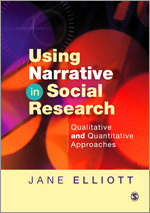Using Narrative in Social Research
Qualitative and Quantitative Approaches
- Jane Elliott - University of London, UK
Case Study & Narrative Analysis
`This important book does an impressive job of synthesising a complex literature and bringing together both qualitative and quantitative methods of narrative analysis. It will become a milestone in the development of narrative methods. Although ground-breaking in many ways, it is very clearly written and accessible to readers from a wide variety of backgrounds and methodological experience' - Nigel Gilbert, University of Surrey
`An elegantly written, scholarly and accessible text. Jane Elliott shows a sophisticated appreciation of contemporary methodological developments, and makes a persuasive case for the use of narrative approaches in both qualitative and quantitative research. The book challenges and advances debates about combining methods, and shows how stories can work within and across conventional research boundaries. It is a truly original contribution to the literature' - Amanda Coffey, Cardiff School of Social Sciences
`An outstanding book. Jane Elliott breaks new ground by demonstrating to new generations of social scientists how the power of narrative can fruitfully be harnessed in social research. This is a "must read" book' - Professor Mike Savage, University of Manchester
This is a lucid and accessible introduction to narrative methods in social research. It is also an important book about the nature, role and theoretical basis of research methodology in general.
Jane Elliott instructs the reader on the basic methods and methodological assumptions that form the basis of narrative methods. She does so in a way that is practical and accessible and in a way that will make the book a favourite with students and experienced researchers alike.
Elliott argues that both qualitative and quantitative methods are characterised by a concern with narrative, and that our research data can best be analyzed if it is seen in narrative terms. In concrete, step-by-step terms she details for the reader how to go about collecting data and how to subject that data to narrative analysis, while at the same time placing this process in its wider theoretical context.
She works across the traditional quantitative/qualitative divide to set out the ways in which narrative researchers can uncover such issues as social change, causality and social identity. She also shows how the techniques and skills used by qualitative researchers can be deployed when doing quantitative research and, similarly, how qualitative researchers can sometimes profit from using quantitative skills and techniques.
"This book provides both a fascinating and a challenging read. What sets this text apart from other books on research methodology and methods is that it does not focus exclusively on either quantitative or qualitative research approaches, but rather attempts to bridge the divide. The book should be compulsory reading not only for those aspiring to undertake narrative research and those students undertaking higher degree research courses, but also for those more experienced researches wishing to explore contemporary issues in research methods and methodology. As a recent recruit to a lecturer-practitioner post with little recnt experience in the subject area covered by this book, i found it met my needs very well. I would certainly recomment this book for purchase." Dr Andrew Pettipher, University of Nottingham, UK.
Useful in generic terms for any student of the social sciences interested in how Narrative can be used in research
For many undergraduate students, narrative will not be a method for research that comes first to their mind, with approaches in earlier forays at school being based around questionnaires and interviews. The guidance provided in this text is accessible to both early users of narrative as well as more experienced researchers to enhance their technique and develop skills within this method to suit a variety of purposes.
Using Narrative in Social Research. I also find this book quite useful for students. This is because most research reports involve large extent of narrative account. This books has been design to meet the challenging needs of students especially those who are doing qualitative studies for the first time.
This book is fine, but not as useful as others.
This is a well structured and informative text for those students considering narrative research methods.
This book was found to be very practical and explains the using of narrative in social research very clearly and simplistic. This book is easy to read and understand and will most definitely add value to students registering for postgraduate research. This book will most definitely be recommended to the University of South Africa Library.
More and more of my MA students are opting for research which demands a narrative approach; I am recommending this text as it is a very good introduction to narrative research. Elliott's focus also on narrative as a bridge between qualitative and quantitative research is particularly insightful.
It is an excellent book which explores the narrative in the social sciences.The book gives an interesting shift how to apply narrative in qualitative and quantitative research.
This book is an essential reader for students trying to use narrative methods. I have recommended this to my project students doing narrative reviews.
A clearly written and very comprehensive volume on using narrative in social research. The suggested readings for discussion at the end of each chapter are very helpful for tutorials. I would highly recommend Jane Elliot's book.


